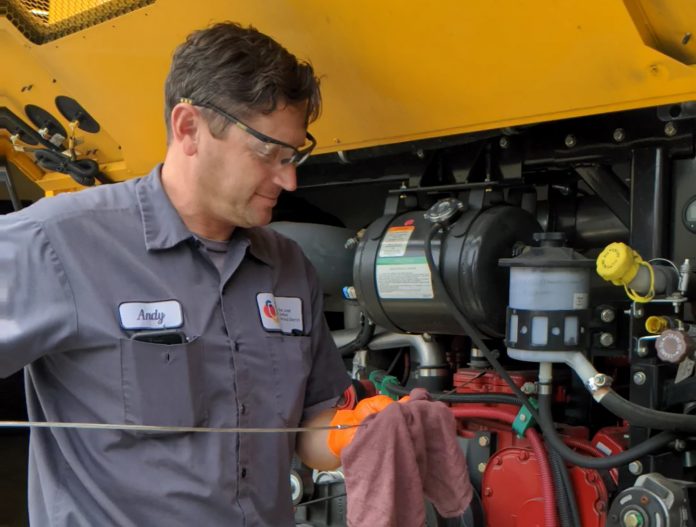While school buses that sit for an extended period of time don’t generate much concern from leading maintenance professionals, they indicated that unprecedented route numbers required during the new school year could put a strain on school district and bus contractor garages.
While many of the garage experts featured in the August edition of School Transportation News magazine are playing a game of wait-and-see when it comes to what the new year will hold during COVID-19, especially with regard to rising costs associated with additional necessary tire replacements, others are anticipating the changes and challenges won’t be much different than previous years.
Mark Smith, the lead technician at East Allen County Schools in Indiana, said prior to COVID-19 his district was serving 6,700 students and running over 1.7 million miles a year, which is just over 9,800 miles a day and nearly 100 miles per daily regular bus route. With running such an operation, he concluded that he is not concerned about tire wear.
“At this time, our proposed schedule will be very similar to last year, with the exception of limited use of extracurricular trips,” Smith said. “Our service cycles will be the same, but the drivers will be required to clean more often, as in after each run and between each route. We are also looking at our deep cleaning schedule, [we are] still in the process of deciding how that will work.”
Meanwhile, Donald Chestnut, a mechanic at Toronto City Schools in Ohio, said if the buses are running more due to social distancing guidelines, there will need to be adaptions made to the main technician schedule. He added most maintenance will need to take place on the school campuses themselves to be sure the buses are available when needed for the increases in routes.
“There is some concern if the districts have extra runs and extracurricular activities, but if the sports are canceled, then the millage will balance out,” he explained. “The tires will need to be inspected before every new route. If more miles are placed on the buses due to an increase in runs, the tires will show wear quicker and will need to be replaced.”
Brockport Central School District in New York state will also be continuing with its regular maintenance schedule during the upcoming school year. Head Mechanic Scott Miller expressed no concerns about tires as they are already inspected every 35 days. He said that any questionable tires are immediately replaced.
David Brewington, the senior technician for the South Carolina Department of Education, shared he is concerned about the modifications that might need to be made going forward into the new school year. He noted that based on the current recommendations of 46 percent student passenger capacity, SCDE’s bus runs could potentially double if the same amount of kids as last year would have to be transported daily. But due to different learning models the districts are proposing, including hybrid or remote learning, he anticipated doubling routes won’t be the case.
“One area of our current maintenance plan that will need modifying is the fueling schedule,” he said. “The SCDE fuels all the school buses using mobile tankers, wet hosing, [tanks fuel their fleet on-site]. If districts’ schedules are altered in such a way that requires the buses to remain operating more during the day, we will have to amend our current fueling schedule in order to provide uninterrupted service.”
He noted that South Carolina buses are currently fueled between 8:15 a.m. and 1:30 p.m.
Another area that Brewington is keeping a close eye on is tire wear. Tires would need to be replaced more often if more routes and trips are run this upcoming school year, he observed.
“Like fueling, tires will require more frequent service and replacing,” he explained. “We have spent a great deal of time during the break inspecting and documenting thread depths. This provides us with a projection chart so that we can better stay ahead of tire replacements.”
Related: Rethinking School Startup for Students with Special Needs
Related: 2020 Garage Stars Announced: Recognizing School Bus Maintenance Professionals
Related: Cummins Webinar Tackles School Bus Engine Maintenance
Related: Seasons Change but Importance of Proper Tire Choice, Maintenance Remains
Meanwhile, Andy DeBolt, lead equipment mechanic for San Jose Unified School District in California, said he has heard little about what returning to school would look like. He noted the bus garage will remain flexible to adapt as needed to the possible increased mileage. DeBolt said in previous years his district ran buses three to four runs a day, so concerns remain low.
“I am very particular about the tires on our buses,” DeBolt explained. “We tend to replace them earlier than most and certainly at the very first indication of an issue. We made the decision a few years ago to only run Smartway-approved low rolling resistance tires on our fleet, when possible in a positive effort to increase fuel economy. Again, we will remain flexible as the school year goes on and will adapt our service programs as needed. For now, I have budgeted a slight increase in tire-related expenses for the 2020 school year.”
Despite the challenges this next school year could place on school bus drivers, staff and mechanics alike, Tony Lavezzo, fleet supervisor for Tahoe Truckee School District in northern California, advised districts to be proactive and communicate often.
“Look for problems to address, do not wait for them to arise,” he said. “Communicate with your drivers and other department staff to find and solve issues. Having a healthy line of communication where the drivers feel that their issues and concerns are addressed will lead to more uptime and fewer breakdowns.”
















